by Gary Lord
Home - Genesis - 2007 - 2008 - 2009 - Early 2010 - Mid 2010 - Late 2010 - End 2010 - Early 2011 - Mid 2011 - Late 2011 - End 2011 - Early 2012 - Late 2012 - Early 2013- Late 2013 - 2014 - 2015 - Early 2016 - Late 2016 - 2017-19
Chapter Eleven: Late 2011
In early August 2011 former WikiLeaks staffer Daniel Domscheit-Berg promoted his doomed "OpenLeaks" whistleblower site with a lecture at a summer camp of the Chaos Computer Club (CCC), where he challenged members to crack the security of his new platform. Andy Müller-Maguhn - a CCC board member who had spent nearly one year secretly trying to mediate the return of WikiLeaks data "stolen" by Domscheit-Berg and others - was furious that Domscheit-Berg had "given the impression that OpenLeaks is being tested by our people and thus given a kind of CCC seal of approval".
"We do not allow ourselves to be captured. That was outrageous."
The five-person CCC board then expelled Domscheit-Berg for exploiting the "good reputation of the association" in order to promote a supposedly "Open Source" project which they said was "non-transparent". They questioned whether "potential whistleblowers who confide in OpenLeaks can and will be protected in the long term".

Days later, Domscheit-Berg - who had only recently repeated his lie that he "didn’t take any documents from WikiLeaks" - told Der Spiegel that he had "destroyed more than 3,500 unpublished files". He said he had "shredded the files in the last few days to ensure that the sources are not endangered" because he believed Julian Assange could not guarantee safe handling of the material.
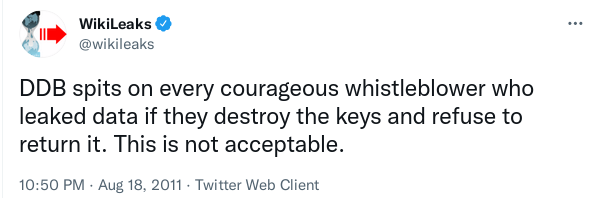
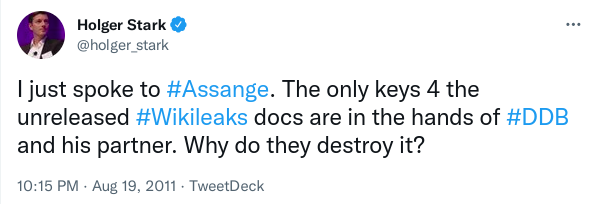
The deleted files reportedly included the US government’s secret "No Fly List", a video of the US military’s indiscriminate bombing of the town of Garani in Afghanistan, inside information from 20 right-wing extremist organizations, and the unpublished Bank of America files.
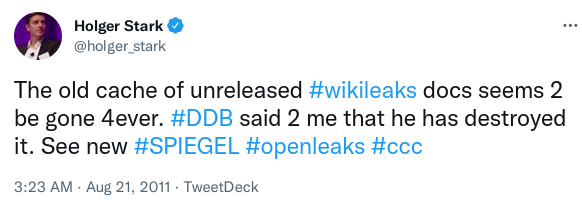
WikiLeaks responded with two statements on WikiLeaks Central in less than twenty minutes. The first statement by Julian Assange was carefully worded to provide WikiLeaks sources with information but also avoid legal problems. It outlined multiple historic concerns about Daniel Domscheit-Berg, including his wife’s high-profile contact with German government officials and a rumour that "the girlfriend of a Berlin-based Israeli intelligence officer" had attended their wedding. Assange said he had "received a warning from a current Western intelligence officer that DDB has been in contact with the FBI, on more than one occasion, and that the information from this contact was 'helpful'." Assange had also "received intelligence from current Western intelligence officer, that Anke Domscheit Berg, personally, came into contact with the CIA" although he had no proof that either Daniel or Anke Domscheit-Berg were "complicit" in such contacts.
WikiLeaks does not record or retain source identifying information, however the claimed destruction of documents entrusted to WikiLeaks between January 2010 and August 2010 demands the revelation of inside information so sources can make their own risk assessments…
DDB secretly, and in clear violation of WikiLeaks internal security directives, recorded internal WikiLeaks encrypted "chat" conversations. He initially publicly denied having done so, but attempted to place many of these recordings into his ghostwritten book, most of which were rejected by his publishers' lawyers as violations of german privacy law. Others he secretly conveyed to hostile media, such as Wired magazine, which had been involved in the arrest and persecution of US intelligence analyst Bradley Manning.
His book, "Inside WikiLeaks", contains many proven malicious libels and breaches of WikiLeaks security policies. The book is promoted throughout U.S. military book stores, by the U.S. military.
After DDB’s suspension in August 2010, he managed, through guile, to convince a German WikiLeaks system administrator, who was an old associate of DDB’s, to obtain the keys and data for a large quantity of then pending WikiLeaks whistleblower disclosures.
The second statement further claimed that Daniel Domscheit-Berg had also taken "internal communications and over 3000 unpublished, private whistleblower communications to WikiLeaks" along with the "secure online submissions system, funds and internal documentation".
Mr. Domscheit-Berg has repeatedly attempted to blackmail WikiLeaks by threatening to make available, to forces that oppose WikiLeaks, these private communications and to which Mr. Domscheit-Berg is not a party. He has stated he will commit this action, should WikiLeaks move to charge him with sabotage or theft. Mr. Domscheit-Berg has refused to return the various materials he has stolen, saying he needs them, solely, to carry out this threat. Mr. Domscheit-Berg has already, secretly, and with malicious intent, disclosed portions of the private communications content to other parties, to the harm of WikiLeaks.
WikiLeaks noted that their sources "have in some cases risked their lives or freedom" attempting to convey leaked information but "WikiLeaks does not collect or retain source identifying information, so fortunately, source identities for this material are not significantly at risk".
In order to provide an environment which would encourage Mr. Domscheit-Berg to return what he has stolen and not to use it for malicious purposes, we have made no further statements until today. This diplomatic silence has been difficult for us, and, is perhaps a warning lesson about secret diplomacy. While we have been silent in order to maximize the chances of regaining the material that was entrusted to us, Mr. Domscheit-Berg has issued dozens of legally harmful falsehoods…
We are making this public statement in a final attempt to make Mr. Domscheit-Berg return the data he has stolen, before he destroys it.
Sadly it was already too late. WikiLeaks said Domscheit-Berg had "sabotaged years of work, none of which was his own" and the cost of rebuilding would ultimately be borne by supporters, many of whom "fight to keep our operations afloat with contributions of twenty dollars a month or less".
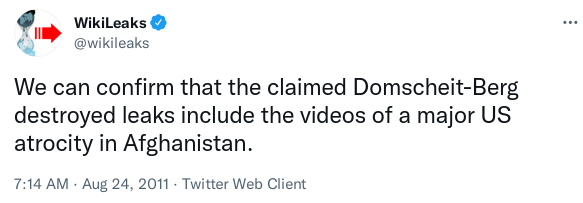
*
Clearly the loss of this leaked material was a huge calamity. But things quickly got even worse.
On 25 August 2011 German newspaper Der Freitag reported (English translation here) that they were in possession of a 1.73 Gb "cables.csv" archive of Cablegate files. Thanks to the Guardian’s February 2010 book by David Leigh and Luke Harding, they also knew the decryption password to unlock it, although they could not confirm if this was the complete unredacted archive. Freitag noted that Julian Assange had contacted their editor Jakob Augstein a week earlier, warning him not to endanger lives.
WikiLeaks had also telephoned the White House to warn them of the impending release, saying Julian Assange wanted to speak to Hillary Clinton. But they struggled to get past junior officials:
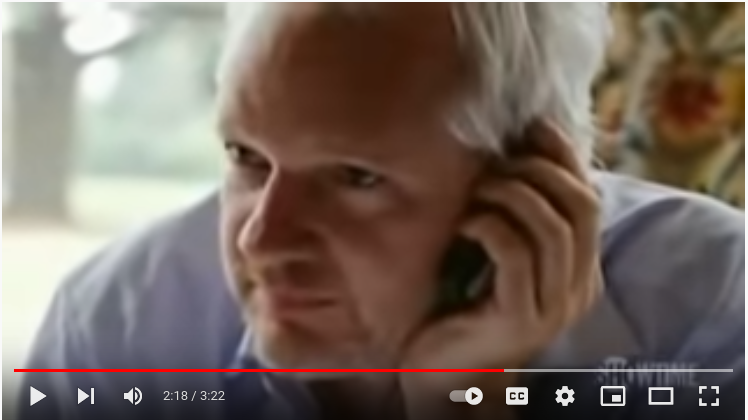
"G’day Chad. This is Julian Assange. To try to make it clear: we don’t have a problem, you have a problem. We are trying to help you solve your problem because we are indirectly connected to your problem."
- NOTE
-
Assange later compared the episode to a scene from the movie "Doctor Strangelove", where Peter Sellers calls the White House to warn of an impending nuclear attack, only to be put on hold. To make matters even more bizarre, it was not a State Department official who eventually responded, but Liza Shields, the (ex-)partner of Google boss Eric Schmidt, who had visited Assange in Norfolk months earlier. Assange said the idea that the Google chairman might be doing “back-channel diplomacy” for Washington was at that time "a novel thought".
Der Freitag reported that in late 2010, after Daniel Domscheit-Berg and others had departed WikiLeaks, a copy of the Cablegate archive was entrusted to CCC’s Andy Müller-Maguhn, who had been secretly trying to mediate the return of "stolen" data. The encrypted "cables.csv" file was posted on a public BitTorrent download site soon afterwards. Der Freitag did not say who did this. Those in the know later cited "well-intentioned WikiLeaks supporters". Assange told the State Department that overbearing pressure from the US government was to blame.
"This is an example of when you push people into a corner, they stop behaving in a step-by-step methodical manner because of the threat that they are under.
In any case somebody had clearly told Der Freitag - who had a business partnership with the Guardian and were now working with Domscheit-Berg on the "test phase" of his new OpenLeaks project - where to find the archive.
Ominously, Der Freitag were not the only people who knew where to find the archive and how to open it. Word was spreading quickly. Der Spiegel reported that "in an effort to prove that Assange couldn’t be trusted, people associated with the OpenLeaks project recently began talking about the hidden diplomatic cables". Assange later wrote that Domscheit-Berg "was cultivating business relationships with a variety of organizations and individuals by shopping around the location of the encrypted file, paired with the password’s whereabouts in the book."
By 30 August former State Department spokesman P.J. Crowley was telling Associated Press that “any autocratic security service worth its salt” would probably already have the complete unredacted archive. Scottish journalist Nigel Parry was the first to document the process of discovery:
In the evening of August 30th, I started searching the various Wikileaks torrents online and that I’d downloaded, looking in directories for [an] encrypted file…
Note the word "downloaded": because the archive had been posted on a decentralised BitTorrent site, thousands of WikiLeaks supporters around the world would have already downloaded the full encrypted archive AND ALSO UPLOADED IT TO OTHERS without anyone ever realising they could open it with the help of the Guardian book. An anonymous Twitter account @Nin_99 had noticed that Der Spiegel said the archive was in a hidden sub-directory and pointed Parry to: 'http://193.198.207.6/wiki/file/xyz/'
In the directory, date-stamped 9 June 2010, were 4 files, all encoded with Pretty Good Privacy (PGP) encoding, the files names with '*.gpg' suffixes.
I started at the bottom of the list, putting in the David Leigh password. It unzipped z.gpg into a file called z.7z. Opening that file and extracting it using the Ez7z compression/decompression program, the file spat out a file called 'cables.csv', dated with a creation date of April 12, 2010 at 9:22PM.
It was a 1.61GB file but it had been reported in the German press to be 1.73GB. A closer look at my file system reporting showed the file size to be both 1.61 GB and 1,730,507,223 bytes. It was easy to see how the byte amount could be mistranslated as 1.73GB.
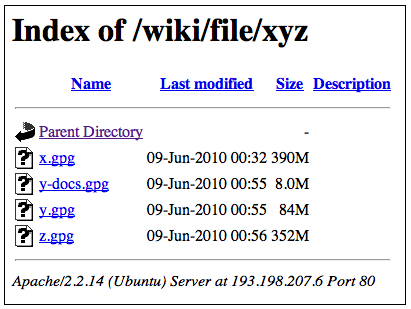
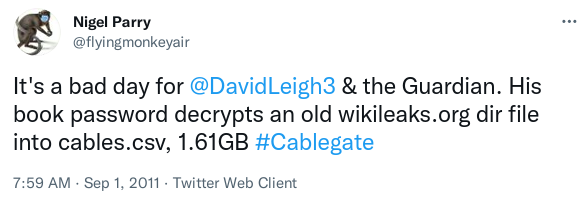
Parry e-mailed Wikileaks, who released a statement within 20 minutes:
A Guardian journalist has, in a previously undetected act of gross negligence or malice, and in violation a signed security agreement with the Guardian’s editor-in-chief Alan Rusbridger, disclosed top secret decryption passwords to the entire, unredacted, WikiLeaks Cablegate archive. We have already spoken to the State Department and commenced pre-litigation action. We will issue a formal statement in due course.
Within an hour, @Nin_99 had uploaded the unredacted cables onto the Internet. Within two hours, the cables were also available at Cryptome.org. Curiously, however, none of those who first revealed and published the Cablegate archive were ever targeted or even questioned by the US government, who reserved their righteous fury for WikiLeaks alone. At the Assange extradition trial ten years later, John Young of Cryptome noted that nobody had ever asked him to take the files down from his site.
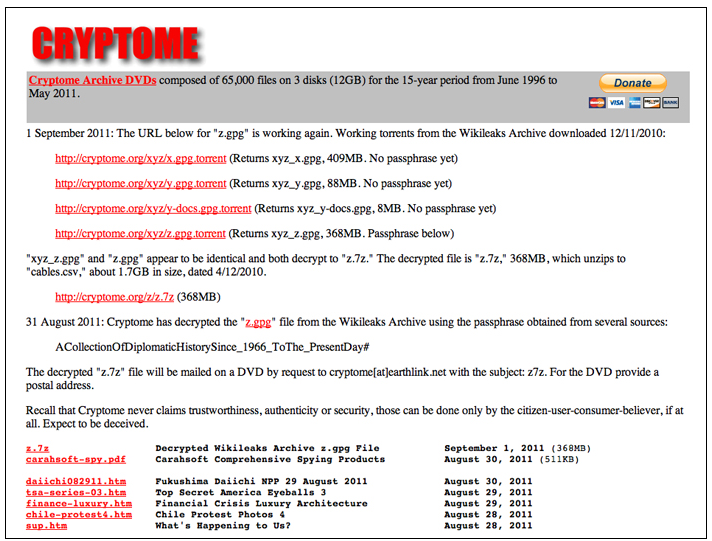
Facing a barrage of condemnation on Twitter, Guardian editor David Leigh totally denied any responsibility:
Shame to see time-wasting efforts to drag Guardian into #Assange-Domscheit-Berg row over #wikleaks leaks. No dog in that fight, folks
Deranged nonsense from Assange, attempting to deflect blame on to Guardian for his own chaotic mistakes. Sad to watch
On 31 August 2011 a widely-shared anonymous pastebin post that claimed to be "from Berlin" specifically blamed Domscheit-Berg - who just months later was rated number 24 in the "Top 100 thinkers" of 2011 by Foreign Policy magazine - for revealing the archive’s location:
Using this these two facts (pw+hidden file location), he then went around ingratiating himself with various players by handing them the entire Cablegate archive under the mutually deniable cover of "warning" them about the Leigh book. Enraged after being expelled from the CCC he "gave" the cables in this way to more and more people in exchange for alliances and positive spin culminating with the now infamous Freitag and Information.dk articles and now the thing is fucking everywhere…
On 1 September 2011 WikiLeaks released a full statement, noting that knowledge of the "Guardian disclosure" had "spread privately over several months but reached critical mass last week".
For the past month WikiLeaks has been in the unenviable position of not being able to comment on what has happened, since to do so would be to draw attention to the decryption passwords in the Guardian book. Now that the connection has been made public by others we can explain what happened and what we intend to do.
WikiLeaks has commenced pre-litigation action against the Guardian and an individual in Germany who was distributing the Guardian passwords for personal gain…
WikiLeaks advanced its regular publication schedule, to get as much of the material as possible into the hands of journalists and human rights lawyers who need it. WikiLeaks and its partners were scheduled to have published most of the Cablegate material by November 29, 2011 – one year since the first publication. Over the past week, we have published over 130,000 cables, mostly unclassified.
WikiLeaks confirmed that they had contacted the State Department in Washington on 25 August but said it took 36 hours to even get a response.
Cliff Johnson (a legal advisor at the Department of State) spoke to Julian Assange for 75 minutes, but the State Department decided not to meet in person to receive further information, which could not, at that stage, be safely transmitted over the telephone.
The Guardian also posted a rather bizarre statement, claiming it was "nonsense to suggest the Guardian’s WikiLeaks book has compromised security in any way."
"Our book about WikiLeaks was published last February. It contained a password, but no details of the location of the files, and we were told it was a temporary password which would expire and be deleted in a matter of hours. It was a meaningless piece of information to anyone except the person(s) who created the database.
"No concerns were expressed when the book was published and if anyone at WikiLeaks had thought this compromised security they have had seven months to remove the files. That they didn’t do so clearly shows the problem was not caused by the Guardian’s book."
But of course the publication of the decryption password had self-evidently compromised security: as soon as the Guardian’s rushed-out book was published it became impossible to somehow make Assange’s elaborate passphrase secret again; it was not WikiLeaks who posted the archive on a torrents site, so they could neither remove nor edit it; and even if they could, the archive had quickly spread to countless users' computers around the world, who now only needed the Guardian’s book to unlock it. As mentioned in Chapter 9, Assange vehemently denied telling Leigh the password was temporary: it was the secure server which was temporary, as even the Guardian book itself stated. And as a cryptography expert testified years later, the encryption key could not be changed without re-encrypting the whole archive file. The Guardian’s criticism was absurd.
WikiLeaks staff were now facing another urgent moral dilemma: as governments and other powerful entities around the world now had access to the full unredacted Cablegate archive, shouldn’t all those whose names appeared in the US cables also have full access, so that they could read what was said about them and prepare for any possible repercussions? Wikileaks decided to ask their Twitter followers to vote on whether they supported the publication of the unredacted cables. The response was an overwhelming "YES".
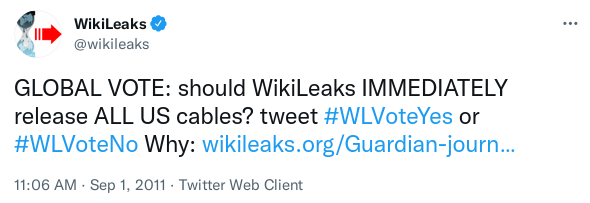
On 2 September 2011 WikiLeaks published the full archive of unredacted US diplomatic cables in searchable format. Critics had already been unfairly deriding Julian Assange as "not a real journalist" and claiming that WikiLeaks just "dumps" information online. Many of them must have been delighted with the latest turn of events.
"As usual, many of those running around righteously condemning WikiLeaks for the potential, prospective, unintentional harm to innocents caused by this leak will have nothing to say about these actual, deliberate acts of wanton slaughter by the U.S. The accidental release of these unredacted cables will receive far more attention and more outrage than the extreme, deliberate wrongdoing these cables expose. That’s because many of those condemning WikiLeaks care nothing about harm to civilians as long as it’s done by the U.S. government and military; indeed, such acts are endemic to the American wars they routinely cheer on. What they actually hate is transparency and exposure of wrongdoing by their government; “risk to civilians” is just the pretext for attacking those, such as WikiLeaks, who bring that about…
“Once WikiLeaks realized what had happened, they notified the State Department, but faced a quandary: virtually every government’s intelligence agencies would have had access to these documents as a result of these events, but the rest of the world — including journalists, whistleblowers and activists identified in the documents — did not. At that point, WikiLeaks decided — quite reasonably — that the best and safest course was to release all the cables in full, so that not only the world’s intelligence agencies but everyone had them, so that steps could be taken to protect the sources and so that the information in them was equally available.”
The Guardian continued to ignore their pivotal role. An editorial on 2 September 2011 blamed Assange alone for the leak, saying the leaked archive "was not the original file accessed by the Guardian last year". It didn’t even mention the password!
A handful of people knew of the existence of this republished file and, realising its potential for harm, they did not publish any clues as to how it might be accessed. WikiLeaks, by contrast, tried to blame others for the leak, hinted at how it could be accessed, and then finally decided to publish it all to the world in an unredacted form.
This was clearly unhinged nonsense. Desperate to avoid blame, the Guardian editors then claimed WikiLeaks had "dwindled to being the vehicle of one flawed individual – occasionally brilliant, but increasingly volatile and erratic."
There was no compelling need, even with the recent disclosures of the internal leak, for WikiLeaks to publish all the material in the form in which it did. Julian Assange took a clear decision this week: he must take the responsibility for that.
Assange later told New Scientist that WikiLeaks’ usual editorial “harm minimisation” procedures became irrelevant after other websites published the full unredacted cables. He said the public needed a reliable source for the cables and WikiLeaks had become a "trusted brand" for such material. He also blamed the Guardian for exposing "our internal security mechanisms” by publishing the lengthy passphrase:
Even if the passphrase had expired – it hadn’t in this case – the way it is put together, alongside knowledge of the use of an additional word, gives an attacker very strong clues as to how an organisation habitually structures its keys, passwords or passphrases.
- NOTE 1
-
Goran Rudling suggested that David Leigh and his Guardian colleagues may have deliberately confused the terms "password" and "encryption key". This book has used the term "password" or "passphrase" above because it was widely quoted as such but it is important to understand the distinction: an encryption key is used to encrypt and decrypt a file, whereas a password just provides access. If you access an encypted file but don’t have the key, all you will see is random characters (i.e. gibberish). Rudling also has an interesting timeline of Domscheit-Berg’s involvement with WikiLeaks.
- NOTE 2
-
In February 2012, Daniel Domscheit Berg was re-admitted to the Chaos Computer Club. Andy Müller-Maguhn, a CCC member since 1986 who was now considered "too close to Julian Assange", was not re-elected to the board. To his credit, however, when Domscheit-Berg was contacted by German police in 2017 and told that US authorities wished to talk to him about the WikiLeaks Grand Jury, he reportedly said was not interested in speaking to the FBI.
- NOTE 3
-
On 22 December 2010 Norwegian newspaper Aftenposten claimed to have gotten hold of the full archive of US Embassy cables "without any clauses or bonds". Presumably these came via the Guardian or Heather Brooke (see Chapter Seven) although the source has never been revealed.
*
In the wake of the 2008 global financial crisis, governments around the world had been pushing ever more extreme "austerity" measures. This helped trigger the Arab Spring and other anti-government protests from Iceland to Iran. The Spanish Indignados or 15-M Movement, which started on 15 May 2011, partly inspired by anti-austerity protests in Greece a year earlier, in turn helped inspire the first Occupy Wall Street protest in New York on 17 September 2011.
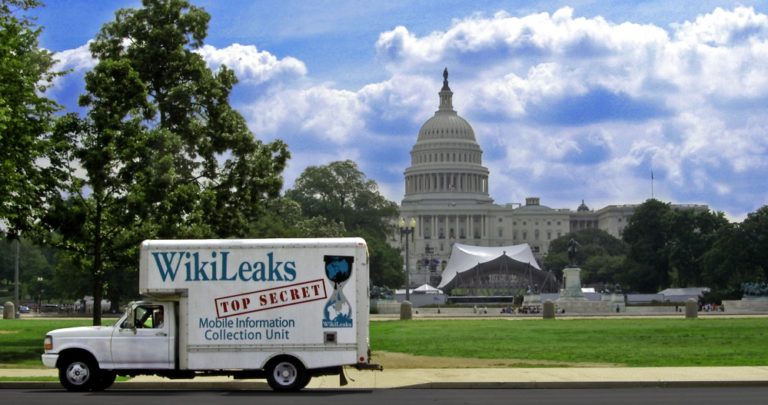
On 8 October a huge protest was held in London’s Trafalgar Square to mark ten years of war in Afghanistan. Speakers included Tony Benn, John Pilger and Jemima Khan. Julian Assange told the crowd of thousands that the media had to bear responsibility for starting wars, and many journalists were "war criminals":
Margaret Thatcher had it right; there is no society any more. What there is is a transnational security elite that is busy carving up the world using your tax money. To combat that elite we must not petition; we must take it over. We must form our own networks of strength and mutual value which can challenge those strengths and self-interested values of the warmongers…
When we understand that wars come about as a result of lies peddled to the British public and the American public and the publics all over Europe and other countries then who are the war criminals? It is not just leaders, it is not just soldiers, it is journalists; journalists are war criminals. And while one might think that that should lead us to a state of despair, that the reality that is constructed around us is constructed by liars, is constructed by people who are close to those that they are meant to be policing, it should lead us also to an optimistic understanding because if wars can be started by lies, truth can be started, peace can be started by truth.
So that is our task and it is your task. Go and get the truth, get into the ballpark and get the ball and give it to us and we’ll spread it all over the world."
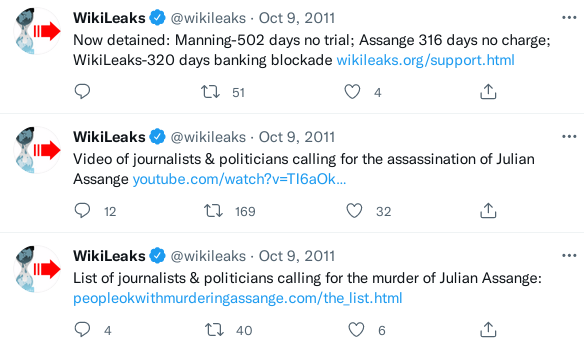
A week later, on 15 October, Assange addressed another huge crowd at the Occupy London camp outside St Pauls’s Cathedral. As he arrived, accompanied by two bodyguards, Assange was physically seized by police for wearing a Guy Fawkes mask - a symbol of the #Anonymous movement - because a new UK law had outlawed the wearing of masks in public.
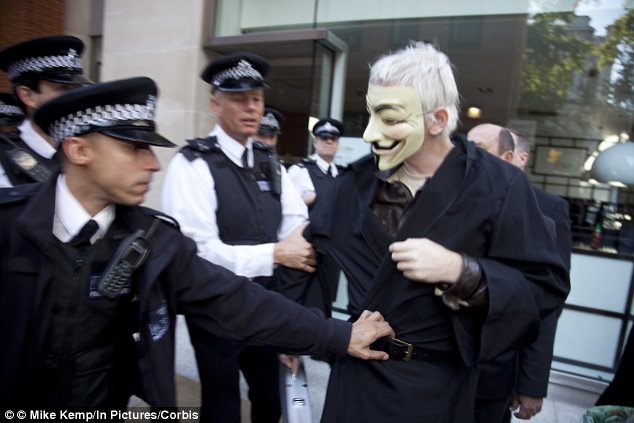
Assange then made a quick speech to nearby protesters where he confirmed he had been unmasked but not arrested, and acknowledged the support of #Anonymous hacktivists.
As we saw today, it is now impossible for people to move in an anonymous way… Sometimes it may be legitimate to deny that anonymity, but we should not accept it until Swiss bank accounts and offshore bank accounts are also denied their anonymity…
I ask that all of you demand that foreign bank accounts be opened up and made transparent, the same way that I today have been forced to be made transparent."
Assange later addressed the main protest from the steps of the Cathedral:
What is happening here today is a culmination of dreams that many people all over the world have worked towards from Cairo to London. What we face today is the systematised destruction of the rule of law. People are being laundered through Guantanamo Bay to evade the rule of law and money is being laundered through the Cayman Islands and London to evade the rule of law. This movement is not about the destruction of law, it is about the construction of law.
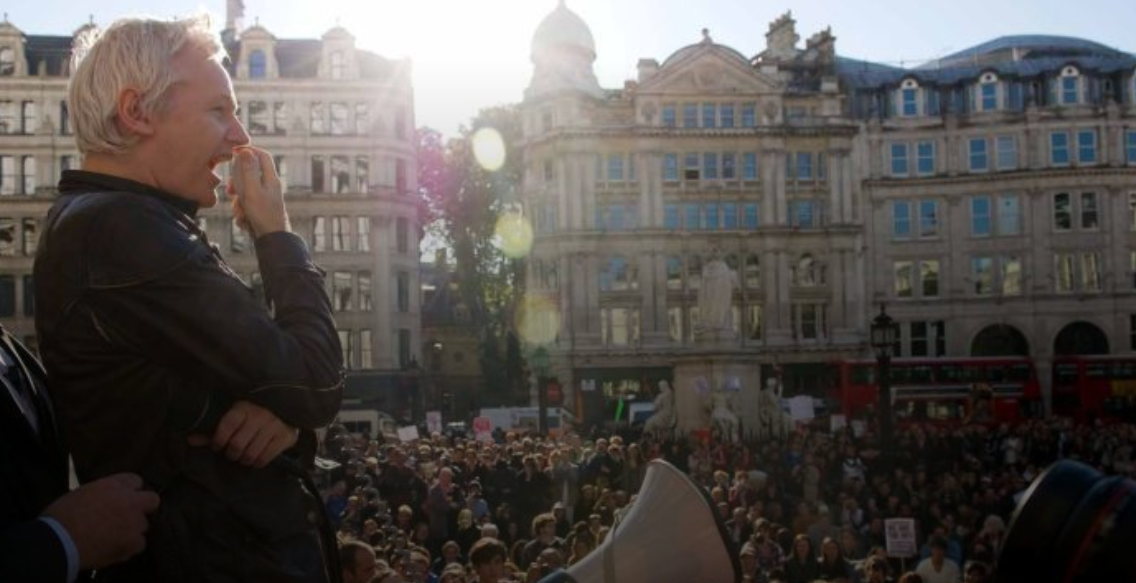
Assange also held an inpromptu press conference where he condemned the banks who sought to censor WikiLeaks and "the rest of the quality press":
"Why is it that banks, even more than military and intelligence organisations, have attacked WikiLeaks? Because banks are all about secrecy… More than any other country, more than any other town, England and London is where money is hidden. Wherever corruption starts in the world, it ends in London."
*
24 hours earlier, a search warrant was signed in Alexandria, Virginia, by US Magistrate Judge Theresa Carroll Buchanan, seeking information from Google on WikiLeaks supporters. Although its existence was not revealed for two more years, the court order confirmed that the US Grand Jury investigation was extremely broad and "using subpoena powers rarely wielded against bloggers and journalists".
Smari McCarthy and Herbert Snorrason, two Icelandic freedom of information activists who have discussed their work assisting WikiLeaks publicly, were informed of the federal District Court order Tuesday evening in Reykjavik, via e-mail, weeks after the gag order preventing Google from revealing the subpoena was lifted on May 2.
Cables released under FOIA just weeks later showed that the Australian embassy in Washington had reported a year earlier that the US Grand Jury investigation of WikiLeaks was "unprecedented both in its scale and nature". And yet politicians in Australia, Britain, Sweden and the USA continued to pretend otherwise.
*
On 2 November 2011 Julian Assange was advised that he had lost his High Court appeal against extradition to Sweden, with Lord Justice Thomas and Mr Justice Ouseley denying that it would violate his human rights. The judges also awarded £19,000 costs against Assange. British media reported that the WikiLeaks founder "could find himself in a Swedish jail by the end of the month."
The only recourse for Assange’s lawyers was to lodge an appeal with the Supreme Court against the High Court’s judgment. This meant even more expense, and even more delays. Assange made a short statement to journalists outside the court, ignoring their shouted questions.
"No doubt there will be many attempts made to try to spin these proceedings as they occured today but they were merely technical. So please go to swedenversusassange.com [site now defunct:archived link] if you wish to know what is really going on in this case."
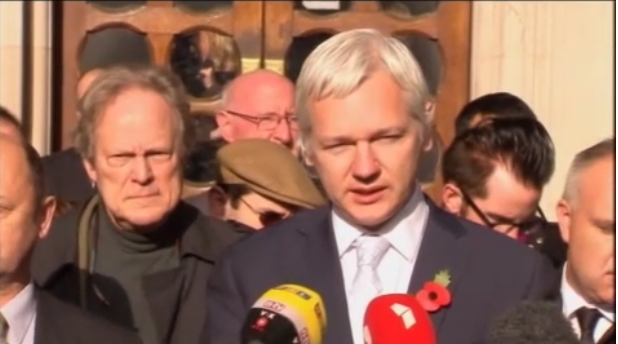
Frontline Club founder Vaughan Smith, a former Army officer and war correspondent, bristled at media hostility towards his long term house guest at Ellingham Hall:
I have seen a human side of him that hasn’t been represented in the press. He is incredibly popular with my children, who see him as sort of an uncle figure. He’s somebody who will listen to you, and he’s somebody who will give you time and give you attention and help you… He’s damn good company.
Smith also ridiculed media claims that the much-vaunted "age of WikiLeaks" was already over.
I think there are lots of bullies here. I think the British press have been bullying. I think the American government have been bullies. But it’s wider than that… Julian is presented as some sort of slightly nutty proponent of radical transparency. Actually, the truth is, he isn’t anything of the sort.
I think it would be foolish to determine WikiLeaks is over. It’s far too premature for that… I don’t think we’ve seen the end of Assange.
*
On 9 November 2011 the British Director of Public Prosecutions, Keir Starmer (who later became leader of the UK Labour Party) made a secretive visit to Washington DC. Starmer led a five-person British delegation that met with US Attorney General Eric Holder for 45 minutes. The head of US Department of Justice’s national security division was also in attendance.
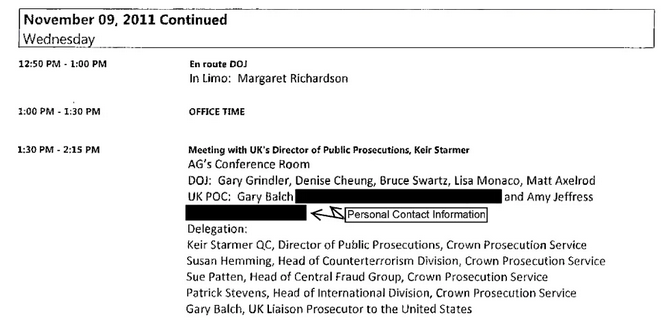
Starmer had visited Washington two years earlier, and he returned again in 2012 and 2013. It became his most frequent foreign destination while he was in charge of the Crown Prosecution Service (CPS). Sadly we do not know what was discussed at these meetings because the CPS later deleted all their records of the visits.
*
On 6 November Jennifer Robinson and Julian Assange published an article in the Sydney Morning Herald criticizing Australia’s "hate speech" laws. Many supporters were flustered by Assange’s decision to defend Rupert Murdoch’s rightwing News Limited columnist Andrew Bolt, who had previously called Assange a "patronising, supercilious racist git". Ironically, Bolt had just been convicted for publishing racial slurs.
Citing the USA’s First Amendment, Robinson and Assange argued that the state should not be allowed to regulate what political speech is deemed acceptable.
In much of Europe and Australia, it is unlawful to deny that the Holocaust took place - this is "acceptable" censorship. But in Turkey it is a crime to assert that the Armenians were subjected to genocide. Imagine if Australia introduced a law prohibiting use of the word "genocide" in respect of the treatment of indigenous Australians? …
Free speech must protect all speech, however offensive. Debates that offend the "ordinary" or "typical" Australian are precisely the debates we need. It is precisely when the majority shares a view that it needs to be challenged, because if it is wrong, then we are all imperiled.
Given that Assange was himself facing years in jail if extradited to the USA, his comments reflected deep personal convictions:
The law, whether civil or criminal, is a serious business. At its end is the deployment of armed police to imprison people or seize their assets by force. It should never be used to regulate disfavoured views.
*
On 17 November 2011 US President Barack Obama addressed the Australian Parliament and announced an increase in military co-operation, including a permanent rotational force of 2,500 US Marines at a new base outside Darwin. As part of his new "Pivot To Asia" policy Obama declared that the USA was "a Pacific power, and we are here to stay."
"Today I can stand before you and say with confidence that the alliance between the United States and Australia has never been stronger… So here, among close friends, I’d like to address the larger purpose of my visit to this region - our efforts to advance security, prosperity and human dignity across the Asia Pacific…"
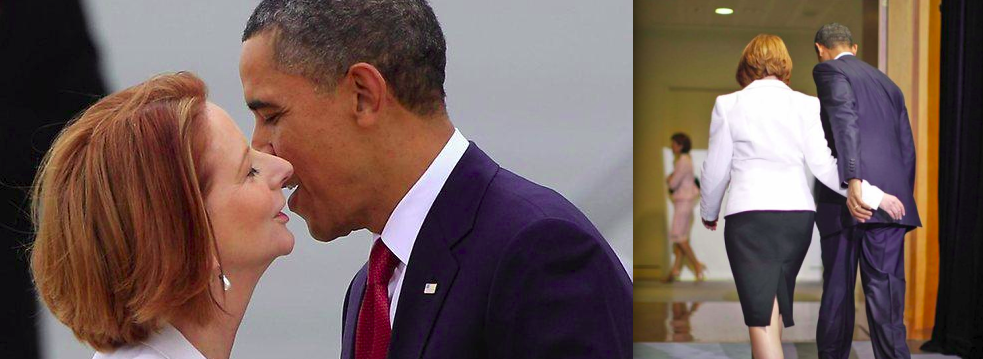
On the lawns outside Parliament House, hundreds of protestors chanted: "Assange and Manning! Let them go! The people have the right to know!" Julian Assange’s mother Christine Assange addressed the crowd, saying "the Australian government has done nothing for Julian” and condemning the "star-stuck" attitude of Australian politicians. After thanking supporters and urging them to “continue fighting for my son” she told media that the USA should accept blame for the “lax security” which had lead to the release of their secret documents through WikiLeaks.
“The consensus of the Australian people I’ve spoken to is that the credibility loss at the moment - globally, for the US - is coming more from their reaction to WikiLeaks than the leaks themselves.”
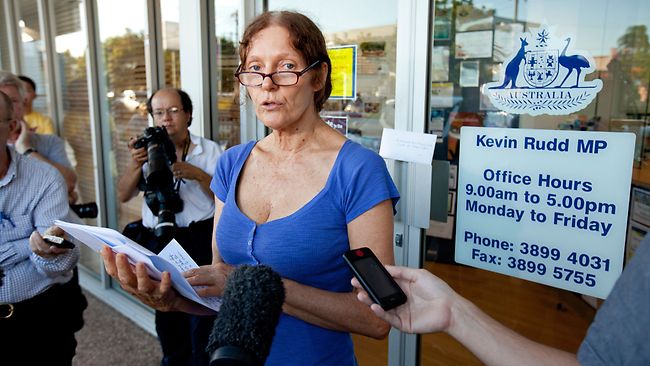
*
"The Walkleys" are the most prestigious awards in Australian journalism. On 27 November 2011 the Walkley Foundation announced that WikiLeaks had won the Walkley Award for "Most Outstanding Contribution to Journalism". Judges said Wikileaks applied new technology to “penetrate the inner workings of government to reveal an avalanche of inconvenient truths in a global publishing coup”.
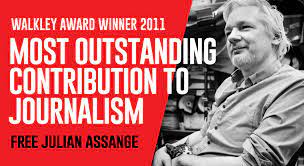
In his acceptance speech Assange said the work of WikiLeaks had created a lot of powerful enemies but also good friends: "it has brought out the best in people: courage, loyalty, compassion and strength".
We journalists are at our best when we share with activists and lawyers the goal of exposing illegality and wrong-doing — when we help hold others to account. This award is a sign of encouragement to our people and other people who labour under difficult conditions in this task.
Our lives have been threatened, attempts have been made to censor us, banks have attempted to shut off our financial lifeline. An unprecedented banking blockade has shown us that Visa, Mastercard, PayPal, the Bank of American and Western Union are mere instruments of Washington foreign policy. Censorship in this manner has been privatized.
Powerful enemies are testing the water to see how much they can get away with, seeing how they can abuse the system that they’ve integrated with to prevent scrutiny. Well, the answer is: they can get away with too much. I expected the hate-speech on Fox News, but not the calls by US Senators for the extra-judicial assassination of myself and my staff. Neither did I expect that the United States would aggressively undermine its own constitution to persecute me and my organisation. But I can understand the Washington elites’ reaction. Washington is waging a war against the truth. It was, after all, the truth about Washington and its friends that we revealed.
What I cannot understand is the craven behaviour of the Australian Prime Minister Julia Gillard. It is embarrassing.
A year earlier, Assange reminded the crowded room full of journalists, Gillard had commissioned "an absurd, whole-of-government task force" and "falsely stated that WikiLeaks had acted illegally" - the Australian Federal Police "had to take the embarrassing role of correcting her". The Attorney General had decided not to cancel Assange’s passport, "saying not that it was wrong, but that it was helpful for tracing my movements". And when Assange was awarded the Sydney Peace Prize, the Australian High Commission in London had refused to host the event.
The Australian government has refused to say whether it would block my extradition to the United States from Australia, but it has acknowledged that it has the political discretion to do so. The Gillard government has shown its true colours in relation to how it has handled US pressure on WikiLeaks…
As Australians we shall not despair; as long as we can speak out, as long as we can publish, and as long as the internet remains free, we will continue to fight back, armed with the truth.
Australian independent media site Crikey noted that WikiLeaks had "changed the way journalism is practised forever" and the question now was not so much “what is a journalist?” but “what is journalism?”.
Defining journalism as more of a practice than an occupation also allows us to say that not everything done by people who call themselves journalists qualifies as journalism.
*
*
The author of this book can be found on Twitter: @Jaraparilla
*
Home - Genesis - 2007 - 2008 - 2009 - Early 2010 - Mid 2010 - Late 2010 - End 2010 - Early 2011 - Mid 2011 - Late 2011 - End 2011 - Early 2012 - Late 2012 - Early 2013- Late 2013 - 2014 - 2015 - Early 2016 - Late 2016 - 2017-19
Copyright Gary Lord 2021, 2022, 2023